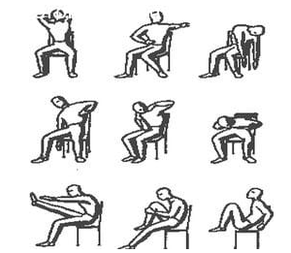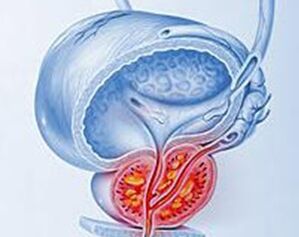Prostatitis in men is the most common urological disease among men. According to statistics, the number of men with this diagnosis is up to 8% of the male population worldwide, of which 1/3 are owners of the chronic form of the disease. In 40% of cases, chronic prostatitis in men is detected before the age of 40.
A characteristic feature of prostatitis is that its acute form is almost completely absent. As soon as it appears, it immediately takes a chronic form.
Cases of complete recovery (spontaneous or as a result of treatment) after the initial acute phase are small. The course of the disease is very slow, and the symptoms of prostatitis are often smoothed out. Prostatitis is manifested in three main syndromes: painful, sexual and dysuric.
Causes of prostatitis in men
The causes of prostatitis are infections, stagnation in the prostate and a combination of these two factors. One of the predisposing factors for the development of chronic prostatitis is the presence of benign hyperplasia in the patient.
The infection can penetrate the prostate as follows:

- through the urethra through sexual contact, as a complication after infectious urethritis;
- through the blood from existing infections in the body (carious teeth, sinusitis, pneumonia and others);
- through lymph from internal inflamed organs (intestinal dysbiosis, hemorrhoids, inflammation of the rectum).
Prostatitis in men is most often of a non-infectious nature (abacterial prostatitis). Its main reason is the violation of blood circulation in the prostate and surrounding organs as a result of stagnation of secretions in it.
Stagnation of secretions can occur in the prostate due to the following factors:
- prolonged sexual abstinence;
- unrealized sexual contact after sexual arousal;
- broken relationship;
- improper ejaculation.
Factors predisposing to the development of prostatitis:
- irregular sex life;
- hypothermia;
- hypodynamics;
- chronic stress;
- chronic alcoholism and others.
Symptoms of prostatitis in men
- pain in the genital area;
- pain in the groin, perineum, suprapubic region;
- frequent urge to urinate;
- painful sensations when urinating;
- pain with ejaculation;
- defective erection or lack thereof.
Very often, chronic prostatitis is predisposed to neurasthenia caused by the above disorders.
Pain in prostatitis is usually radiation, ie it radiates to the sacrum, perineum or scrotum. From the prostate there are nerve endings to all the organs of the small pelvis, so pain is often given in the lower back. Their intensity is different - from subtle to pronounced, which even disturbs sleep. The pain may increase, weaken with sexual abstinence, or, conversely, occur with excessive sexual activity or ejaculation. It should be borne in mind that pain in the sacrum does not always indicate prostatitis - they may also indicate osteochondrosis.
As prostatitis manifests itself in men in a chronic form, here the situation is completely different. Its flow is like waves; periodic exacerbations are replaced by more or less prolonged remissions, during which the disease does not manifest itself in any way. In this case, men rarely go to the doctor, preferring to sit at home. However, this is not a way out of the situation, because prostatitis in men, its worsening, will progress over time. And by spreading through the genitourinary system, it will lead to the appearance of cystitis and pyelonephritis.
Prostatitis in men: consequences

Patients with acute prostatitis usually seek medical help in a timely manner. But if you do not consult a urologist in time, there is a high probability of focal purulent inflammation - prostate abscess. In this case, the body temperature can rise to 39-40 ° C, it becomes hectic (the drop in body temperature exceeds 1 ° C) and a strong fever is occasionally replaced by chills. The pain in the perineum is so pronounced that urination and defecation become extremely impossible. Gradually, the prostate swells and as a result urine retention occurs. Fortunately for men themselves, they are rarely brought into such a state.
Vesiculitis is one of the most common complications of prostatitis, when the seminal vesicles become inflamed. And also epididymo-orchitis, characterized by inflammation of the testicles and their appendages. Treatment of chronic prostatitis in men caused by these diseases will be extremely difficult and time consuming.
Both diseases can lead to infertility. All of the above is more relevant to chronic prostatitis, which has a specific etiology and has developed as a result of sexually transmitted diseases. How to treat prostatitis in men and treatment with any form of medication is prescribed by a urologist.
Treatment of prostatitis in men
How to treat prostatitis in men depends on the form of the disease and its appearance. In the treatment of acute prostatitis, antibiotics are used that penetrate well into the prostate tissue. The prescribing specialist must take into account all the individual characteristics of the disease, the state of the body's immune system and the presence of infectious agents. If the course of the disease is not complicated by anything, patients with acute prostatitis are treated only on an outpatient basis. Only patients with signs of severe and severe intoxication are subject to hospitalization. Such physiotherapeutic methods are widely used: magnetic-laser induction therapy, reflexology, ultrasound, treatment of prostatitis with leeches. Good effect can be achieved by using herbal preparations (herbal medicine), enzymes, cytomediators, immunomodulators. Surgery for prostatitis is indicated in the following cases:
- prostate abscess (trans-urethral or transrectal abscess drainage);
- acute urinary retention (puncture epicystostomy).
Treatment of chronic prostatitis in men is carried out on an outpatient basis, but over a longer period. In addition to the use of antibiotics, suppositories and thermal treatments, prostate massage and reflexology are also performed. In addition, patients with prostatitis are recommended an active lifestyle and the exclusion of alcoholic beverages and spicy foods from use.
Prevention of prostatitis in men
Timely treatment of prostatitis in men, as well as its prevention, contributes to rapid recovery. As a preventive measure to prevent the development of chronic prostatitis, it is recommended:
- regular sex life;
- properly selected diet (varied and nutritious foods with the exception of spicy and irritating foods);
- no alcohol abuse;
- moderate physical activity aimed at improving blood circulation in the organs of the genitourinary system and strengthening muscles, Kegel exercises (tension of the muscles of the perineum with the withdrawal of the anus);
- adequate and timely treatment of infectious diseases of other organs;
- prevention of stagnation in the small pelvis by physiotherapy methods.
To exclude recurrence of the disease - secondary prevention of prostatitis, which includes primary prevention and:
- regular preventive examinations by a urologist;
- passing preventive courses of treatment with fortifying methods, multivitamins;
- physiotherapy methods (especially in spring and autumn).






























